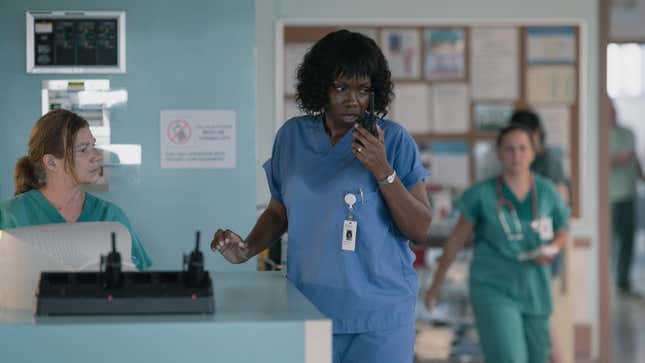
Television has a long history of serving as a de-facto chronicler of America’s past. One can look as far back as Roots in 1977 or as recently as Ryan Murphy’s American Crime Story anthology series to see historical revisionism on the small screen. Apple TV+’s Five Days At Memorial exists very much in that same vein. Tackling the pivotal days following Hurricane Katrina’s landfall in 2005 in New Orleans, this miniseries developed by John Ridley (American Crime, Godfather Of Harlem) and Carlton Cuse (Lost, Bates Motel) is based on Sherri Fink’s award-winning nonfiction book by the same name. It aims to be not only an exhaustive but an altogether authoritative take on what was then the most destructive natural disaster in United States history. Even with such lofty ambitions, this eight-episode series is a gripping affair, an engrossing medical thriller that doubles as a powerful indictment of government and corporate inaction and outright neglect.
Following the aftermath of the storm and of the havoc wreaked by the broken levees that left the city underwater for days on end, 45 bodies were found at Memorial Medical Center in New Orleans once the building was finally fully evacuated on the fifth day after Katrina. All were patients. The question that looms over the series is a simple one: How did all of those people die during that time? (Five Days At Memorial is framed by an investigation that’s also trying to answer just that.)
In a rather schematic fashion, the first five episodes of the show take us on a one-episode/one-day-at-a-time journey. We witness how the medical center’s administration first handled the uncertain hours as the storm ravaged the city and later still how they slowly came to make the best out of their ungodly conditions once flooding waters left them without power, without food, and without any potable water. This all occurs while staffers await help (or orders or guidance, even) from their corporate owners and city, state, and federal organizations. Those orders never came, or came so late that they ended up jeopardizing the main mission of a hospital that size: to do no harm to its patients.
Given the sheer breadth of information that any given episode has to offer its viewers, it’s perhaps excusable how often the scripts rely on expository crutches (staff meetings, investigation testimonials, personal phone calls, news broadcasts) to provide the necessary context to keep the narrative moving forward. At such times, you’re grateful you’re in the hands of such capable actors. Vera Farmiga (Dr. Anna Pou), Adepero Oduye (Karen Wynn), and Cherry Jones ( Susan Mulderick), in particular, are transcendent as, respectively, a doctor, a nurse, and an administrator all trying to navigate how to care and survive in such inhospitable circumstances.
As a director, Ridley wants to suture the fictionalized account he’s creating with the reality many of us have witnessed by intercutting real-life footage throughout. In the first episode, it’s those clips of the hurricane that pummel you into submission. And later, especially when unimaginable images of the storm and its aftermath blink in and out of quiet moments (like a disoriented patient walking toward a window), something becomes clear: This is a television miniseries masked as a historical document, as an official account.

In true Ridley fashion—the Academy Award winner for 12 Years A Slave has long gravitated toward nuanced character studies that disavow easy-to-parse characterizations—Five Days At Memorial does an admirable job of not falling back on lazy conclusions. Probing the humanity of the patients, doctors, and civilians stranded at Memorial during those grueling days, this miniseries intentionally sets itself up as a narrative about what accountability can and does look like. Watching the hospital staff try to figure out which patients should be evacuated first becomes less a question about logistics (though it is) than one about ethics: Do you airlift the ones who need the most care but who require a lot more effort to transport? Or do you prioritize those who are mobile and can easily be boarded onto boats or on helicopters or move up and down several flights of stairs?
Such questions fuel much of Five Days At Memorial and with every new episode, the series drives home the point that any and all answers come up wanting. As staffers begin voicing what will become the euphemistic messaging that led to the investigation in the first place (“All I can tell you is that there was an organized effort to reduce the level of misery the patients had to endure,” Karen says), it’s obvious that their choice could be read as a desperate plea to spare folks some pain, an unspeakable one that required them to go, perhaps, against everything they’d hoped to do when they first signed up for this line of work.
By focusing on the many nurses and patients and administrators that lived through those days at Memorial (including several others at another corporate-owned medical center housed within that same building), Ridley creates a choral effect throughout that refuses any overriding sentiment or narrative. Everyone’s aggrieved pleas (“Why is no one coming to help us?!”) become ever more enraging the more hours you spend at the hospital—and the more time the series spends revisiting that final day and the choices those in charge had to make when faced with an order to evacuate (by an uncaring police force, it must be noted).
There is one argument Five Days makes unequivocally: What happened at Memorial (and in New Orleans in general) was a spectacular failure at the city, state, and federal level. The more Arthur “Butch” Schafer (Michael Gaston) and Virginia Rider (Molly Hager) talk with all those involved for their government investigation, the clearer it becomes that the tragedy that cost 45 people their lives was a preventable one. But at whose feet do you lay their deaths? And what, years later but still dealing with the entanglements of late-stage capitalism and climate change, have we learned?